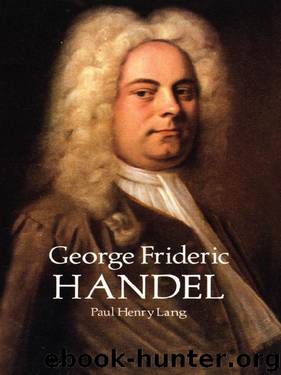George Frideric Handel_Dover Books on Music by Paul Henry Lang

Author:Paul Henry Lang [Lang, Paul Henry]
Language: eng
Format: epub
ISBN: 9780486144597
Publisher: Dover Publications
Published: 2012-04-30T03:00:00+00:00
[3]
THE ENGLISH ORATORIO grew out of the circumstances of Handel’s life, and could not have so grown anywhere but in England. The unique combination of Greek drama and the Old Testament developed from personal experience, from a social order, and from a historical consciousness that were not indebted, as were some of the musical elements, to Italian oratorio or German cantata. The old mystery and miracle play was more didactic than religious, and the didactic quality is likewise present in the sacra rappresentazione and the early oratorio in Italy. Such an art cannot, except in the hands of a few rare creative artists, rise above local, educational, and ethical effect. Thus, even though all these elements, especially the Italian oratorio, are usually listed among the ancestors of the Handelian oratorio, we may safely disregard them. The idea that Handel’s concept is indebted to Greek drama is so clear that one wonders why it was not examined long ago. Rolland perceived it more than half a century ago, but little attention was paid to his hints until Winton Dean took up the question. “It was as though the spirit of Handel had been led unconsciously towards the Hellenic ideal,” says Rolland; yet one wonders whether the process was so passive.
The crucial point for Handel was Racine’s reintroduction of the classic chorus which, significantly, took place in the French dramatist’s last, biblical dramas. This the literary historians consider no more than a “scholastic experiment appropriate to a conventual atmosphere,” 93 but then why does this reactivated chorus rapidly gain the Italian spoken theatre, opera, and then the English oratorio? In the ancient drama the chorus gradually changed from a lyrical to a dramatic role, only to disappear altogether in the new comedy. When it returned, many centuries later, it was a conscious revival and imitation that went far beyond scholastic experiment. The literary historians neglected to examine the proper place of opera in the development of Baroque drama, for in spite of the essential misunderstanding by the Florentine antiquarians, opera did, in effect, cause a rapprochement with the drama of the ancients. Giovanni Vincenzo Gravina (1664-1718), Apostolo Zeno (1668-1750), Scipione Maffei (1675-1755), and Pietro Metastasio (1698-1782) were the principal representatives of this new classicism that was closely allied with music, as indeed the music drama was the most congenial medium for it. They exerted themselves for the improvement of dramatic art in Italy and all of them did so by deliberately falling back on the “ancients.”
This second Camerata, as it were, was no less learned, but far more musical than the original Florentine group.94 Zeno, the first great reformer of opera, attenuated the crudities of the Venetian opera libretto by accepting and introducing into opera elements of the French classical drama. His successor, both in literary tendencies and in the office of Imperial Court Poet in Vienna, Metastasio, created the new art of poesia per musica. He may have been reviled by the Gluckists, and dismissed by most modern estheticians of opera,
Download
This site does not store any files on its server. We only index and link to content provided by other sites. Please contact the content providers to delete copyright contents if any and email us, we'll remove relevant links or contents immediately.
Cecilia; Or, Memoirs of an Heiress — Volume 2 by Fanny Burney(31942)
Cecilia; Or, Memoirs of an Heiress — Volume 3 by Fanny Burney(31928)
Fanny Burney by Claire Harman(26594)
We're Going to Need More Wine by Gabrielle Union(19033)
Plagued by Fire by Paul Hendrickson(17403)
All the Missing Girls by Megan Miranda(15945)
Cat's cradle by Kurt Vonnegut(15333)
Bombshells: Glamour Girls of a Lifetime by Sullivan Steve(14052)
For the Love of Europe by Rick Steves(13898)
Leonardo da Vinci by Walter Isaacson(13315)
4 3 2 1: A Novel by Paul Auster(12372)
The remains of the day by Kazuo Ishiguro(8969)
Adultolescence by Gabbie Hanna(8917)
Note to Self by Connor Franta(7663)
Diary of a Player by Brad Paisley(7559)
Giovanni's Room by James Baldwin(7325)
What Does This Button Do? by Bruce Dickinson(6194)
Ego Is the Enemy by Ryan Holiday(5413)
Born a Crime by Trevor Noah(5373)
